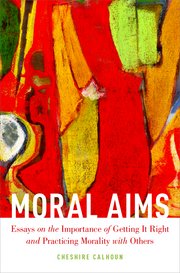About
Most of my work falls at the intersections of normative ethics, philosophy of emotion, and feminist philosophy.
 Philosophical writing, for me, has always been a way of bringing some clarity to problems or questions that I find myself thinking about in daily life. One set of earlier essays, that are now republished under the title Moral Aims: Getting it Right and Practicing Morality With Others, was motivated by the desire to get clear about how critical reflection on what one ought to do is connected to the meaningful practice of morality in a social world where some forms of wrongdoing are conventionalized and where there are significant moral disagreements between people. That led me to take up such topics as civility, common decency, moral failure, and moral responsibility. I was fortunate to have two of those essays selected for the Philosopher’s Annual which anthologizes the best published work of the year. Those were “Changing One’s Heart” and “The Virtue of Civility”.
Philosophical writing, for me, has always been a way of bringing some clarity to problems or questions that I find myself thinking about in daily life. One set of earlier essays, that are now republished under the title Moral Aims: Getting it Right and Practicing Morality With Others, was motivated by the desire to get clear about how critical reflection on what one ought to do is connected to the meaningful practice of morality in a social world where some forms of wrongdoing are conventionalized and where there are significant moral disagreements between people. That led me to take up such topics as civility, common decency, moral failure, and moral responsibility. I was fortunate to have two of those essays selected for the Philosopher’s Annual which anthologizes the best published work of the year. Those were “Changing One’s Heart” and “The Virtue of Civility”.
 In my mid-30s, I switched sexual orientations and discovered to my surprise that my knowledge of and work in feminist theory had not prepared me to think clearly about the workings of gay and lesbian subordination. This led me to a series of essays on the nature of gay and lesbian subordination and its relation to feminist accounts of gender oppression. The most important of those essays, to my mind, is a piece titled “Sexuality Injustice,” published in the Notre Dame Journal of Law, Ethics and Public Policy, where I try to work out the distinctive structure of lesbian and gay subordination. Those essays became my book, Feminism, the Family, and the Politics of the Closet: Lesbian and Gay Displacement.
In my mid-30s, I switched sexual orientations and discovered to my surprise that my knowledge of and work in feminist theory had not prepared me to think clearly about the workings of gay and lesbian subordination. This led me to a series of essays on the nature of gay and lesbian subordination and its relation to feminist accounts of gender oppression. The most important of those essays, to my mind, is a piece titled “Sexuality Injustice,” published in the Notre Dame Journal of Law, Ethics and Public Policy, where I try to work out the distinctive structure of lesbian and gay subordination. Those essays became my book, Feminism, the Family, and the Politics of the Closet: Lesbian and Gay Displacement.
Upon entering my 60s, I found myself thinking a lot about time and about what I’m doing with my time. That took me into my last book project, Doing Valuable Time, in which I explore the various ways that being the kind of being who engages in evaluation and choice on the basis of values is complicated by the fact that we live through time and toward the future. This book was in the works for a very long time. It began from a simple thought: our motivation for living our lives as we do is not simply a function of have good, motivating reasons for choosing one course rather than another but is also connected to how we think about our own temporality. This lead me to think about what conditions our interest in our present and future, what makes a life meaningful, and what makes longterm commitments attractive (or not).
As a moral philosopher, I find myself increasingly drawn to thinking about the positive in our ethical lives. That’s led me into two related projects. One is to work out a multidimensional conception of what it means to have the (prized) status of being a responsible person. Breaking with convention, I think being the kind of being who can be held accountable and blamed is only part of what constitutes this status. The other parts have to do with having what it takes to be compliant with at least the basic norms in social practices and thus fit to be a social participant and recipient of basic trust, and having what it takes to see how the goods promoted by various practices could be promoted through elective, non-required actions that involve taking responsibility. The other project is in some ways a bigger–certainly more grandiose–one: to define the contours of a new subfield of moral philosophy that I’m calling positive moral philosophy.
One of the things I’ve enjoyed about being a professional philosopher is having my fingers in a lot of pies in the profession. I’ve served the American Philosophical Association in a wide variety of capacities over the years—as member and chair of the LGBT Committee and the Inclusiveness Committee, on the Executive Committee and Programming Committee of the Eastern APA, as the Ombudsperson for Nondiscrimination, and most recently as chair of the Board of Officers. I’ve also been honored to be an associate editor for the journals Hypatia and Ethics, and to edit Oxford University Press’s series Studies in Feminist Philosophy.